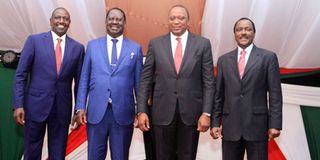BBI proposals purpose-built for the 2022 Kenyatta II succession

From left: Deputy President William Ruto, ODM leader Raila Odinga, President Uhuru Kenyatta and Wiper leader Kalonzo Musyoka at a past event in Nairobi .
What you need to know:
- This BBI change, initiated by President Kenyatta and his foe-turned-fan Raila Odinga, fits this pattern.
But President Kenyatta and Mr Odinga, the architects of BBI, deny this is the case.
The President was profoundly misleading as were the great and good of Lancaster.
Some things I know and many things I do not know. But this I know for certain: The political changes to the constitution proposed by the Building Bridges Initiative (BBI) serve not the people, but the dominant political class.
Kenyans struggled for close to two decades to rid themselves of an all-powerful presidency and verily believed the 2010 constitution rewarded them. But, alas, what does BBI propose?
A president who appoints a prime minister and who he could sack at whim; a president who hires deputy prime ministers who he could fire by fiat; a president who employs ministers he could kick out if and when he fancies.
Some things I know and many things I do not know. But this I know for certain: the trouble with our political system, we were told, is that winner-takes-all format because it embitters losers because they have nothing to show for their valiant efforts at becoming presidents.
Rrights and freedoms
What BBI is proposing here is what a member of my WhatsApp group says is a winner called president who takes all.
He appoints all winners called prime ministers; winners called deputy prime ministers; winners called ministers. Winner will take all, winners will take all. Winners win all!
The BBI proposal confirms that from Kenyatta I in 1963 to Kenyatta II from 2013 to date, and between them Presidents Moi and Kibaki for 34 years, there has always been a struggle for and over, the constitution between the governors and the governed.
The governed have consistently looked to the constitution as the guardian and guarantor of their rights and freedoms, wants and needs. But the governors have always looked down upon and trampled the rights and freedoms of the governed and fleeced their coffers. And they have always changed the law to advantage themselves and disadvantage the people.
The people have always fought hard and long, day and night to get constitutions where the dominant political class has always initiated change that is inimical to the people's interests.
Economic revolution
This BBI change, initiated by President Kenyatta and his foe-turned-fan Raila Odinga, fits this pattern.
Some things I know and some things I do not know, but this I know for certain: BBI proposes an economic revolution, asks us to think big or 50 years down the economic development line.
But it ignores Vision 2030 whose objective remains clear, solid, explained and abundant: transform Kenya into a middle income country with a high quality of life for all its citizens.
Two, I have not read the entire BBI report, but will do, because I will return to it again and again because it is going to hugely impact Kenya’s politics and governance in the short term, before it is cast away for it is purpose-built for the Kenyatta II succession.
But President Kenyatta and Mr Odinga, the architects of BBI, deny this is the case.
Indeed in the build-up to the release of the much-hyped final report of BBI last week, President Kenyatta argued Kenya’s founding fathers envisaged a constitution that would serve us and not enslave us.
Qualifying this expansive view of the basic law by the great and good of our independence, the President argued that Kenyans should not have a rigid view of the constitution.
Devolved units
That is, we should prepare to change the document for it is dynamic. The President was profoundly misleading as were the great and good of Lancaster.
In Lancaster House Kanu accepted the federalist constitution because they did not want to delay independence by haggling with Kadu.
At home, they knew they would beat Kadu. In government they would starve devolved units of cash and eventually kill the federalist experiment altogether. They did just that as they attacked the document too.
Changes to Kenya’s constitution from founding President Jomo Kenyatta to President Moi, expanded the powers of the presidency while restricting that of the people and or their representatives.
The unrelenting mutilation of the supreme law would leave Kenya with a tattered and unrecognisable basic law. But the welders of power loved it, which is why Kenyans’ hard-fought drive for a new constitution would last two decades.





